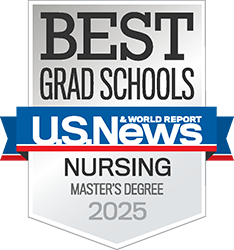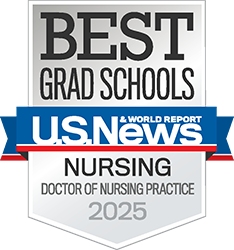

Meeting the need for NPs
HRSA-funded program prepares students to serve the underserved
From the smallest towns to the biggest cities, nurse practitioners play an increasingly vital role in fulfilling the need for health care providers focused on underserved populations. Cizik School of Nursing at UTHealth Houston received a federal grant in June 2023 specifically to help prepare nurse practitioners to practice in rural and urban areas where they are arguably needed most.
The four-year award from the Health Resources and Services Administration (HRSA) of the U.S. Department of Health and Human Services funds the Advanced Nursing Education Workforce (ANEW) grant program. Cizik School of Nursing’s awarded grant, entitled Augmenting Teaching and Learning for APRN Student Primary Care Training (AT LAST), aims to increase the number of nurse practitioners prepared to provide primary, mental health, and substance use disorder care in medically underserved areas.
So far, AT LAST has provided financial assistance to 31 student trainees in the family nurse practitioner (FNP), psychiatric/mental health nurse practitioner (PMHNP), and adult/gerontology primary care nurse practitioner (AGPCNP) tracks of the Bachelor of Science in Nursing to Doctor of Nursing Practice (BSN-DNP) program. Cizik School of Nursing has also established or strengthened partnerships to expand opportunities for clinical placements with facilities in underserved and rural areas. In addition, comprehensive substance use disorder content has been expanded within the BSN-DNP curriculum.
“Student essay responses provided with their applications are heartwarming stories of overcoming extreme circumstances and giving back to others experiencing the same hardships,” said Associate Dean for Graduate Studies and AT LAST project director Susan D. Ruppert, PhD, APRN, FNP-C, ANP-BC, FCCM, FNAP, FAANP, FAAN. “The ANEW grant has provided them with the means to focus on helping these communities while reducing the financial burden of their education.”
Three student trainees recently spoke about their nursing journeys – what brought them to Cizik School of Nursing, what they plan to do next, and how the school’s AT LAST traineeship has helped support their education.
Mutiat Bamiloshin, BSN, RN
At one end of the spectrum, PMHNP student Mutiat Bamiloshin has experience at the oldest and one of the largest public health hospitals in the nation – Bellevue Hospital in New York City. She worked in the child and adolescent mental health unit, where many repeat patients were referred from the child protective services office right across the street.
“The kids we kept seeing were like a mirror of me,” she said. “They were receiving the help I needed as a child.”
Bamiloshin immigrated to the United States from her native Nigeria. One of her aunts was a matron, or nurse manager, who stood up for her as a child and became her role model.
In New York, Bamiloshin earned her GED and became a certified nursing assistant. However, her road to becoming a nurse took a detour through the New York City School Construction Authority (NYCSCA) Opportunity Academy program. She had just completed a fellowship when she got word of her acceptance into the nursing program at the Borough of Manhattan Community College, part of the City University of New York System. She worked her way through school processing multimillion-dollar change orders for the city during the day and then taking a train to night classes.
She eventually earned her BSN from Chamberlain University and moved to Houston with her husband. Bamiloshin got a job as a clinical nurse at The University of Texas MD Anderson Cancer Center and applied to the DNP program at Cizik School of Nursing.
“I was thinking of quitting the program during the first semester because I was paying out of pocket,” she said. The AT LAST traineeship enabled her to continue her education, and she was impressed with the ease of the application process.
“I want to do more,” she said. “I am really glad I got selected for the traineeship. I believe God was trying to tell me something.”
Hannah Dai, BSN, RN
On the other end of the spectrum, FNP student Hannah Dai completed a clinical rotation in Hallsville, Texas, a town of fewer than 5,000 residents. The rural community is just down the road from Dai’s hometown of Longview. She worked in an obstetrics/gynecological clinic caring mostly for lower-income patients.
Dai earned her BSN from Stephen F. Austin University in Nacogdoches and began working in emergency departments there and in the Houston area at the height of the pandemic in the fall of 2020.
“I’ve always been exposed to vulnerable populations through working in the ER,” she said. “A lot of patients get care in the ER because they don’t have insurance.”
She counts a rotation at the clinic adjacent to the Star of Hope Cornerstone Community® as her most memorable clinical experience with the AT LAST program. Star of Hope shelters serve people experiencing homelessness in Houston, and Cornerstone specifically supports women and families.
“As a student, I probably had more time to sit and talk to the patients, and maybe give them education about their health that they hadn’t gotten in the past,” Dai said. “A lot of these patients haven’t had health care, and maybe they find out that they have diabetes but have never had any treatment. Being able to teach them about it can help them live longer.”
Dai, who has a one-year-old daughter, was also paying for school out of pocket and benefited from the AT LAST traineeship in her last semester. She graduated in August 2024 and wants to work in a specialty clinic.
“The financial support offered by the program has been very helpful to have in a semester where we have a lot of clinical hours and can’t work as much, especially having a baby,” she said.
Remigio Acevedo, BSN, RN, CCRN
From a Federally Qualified Health Center near College Station to Parkland Memorial Hospital in Dallas, Remigio “Remmy” Acevedo has cared for all kinds of underserved patients. His work at Parkland earned him recognition as one of the Great 100 Nurses of Dallas-Fort Worth earlier this year.
A Brenham native, Acevedo double majored in nutritional science and Spanish at Texas A&M University, graduating with two bachelor’s degrees. He moved on to Dallas to earn his BSN in nursing from Baylor University and was encouraged to apply for a job in the surgical-trauma ICU at Parkland after completing a clinical rotation there.
“I love the ICU, but I really love taking the time to teach and educate our patients,” Acevedo said. “A lot of the time, the reason they are in the ICU is because of things that could have been prevented.”
Cizik School of Nursing’s reputation as one of the best in the nation attracted him to the BSN-DNP Family Nurse Practitioner track. As a part-time student, he was eligible to apply for the AT LAST program in his last year of studies and is on track to graduate in August 2025.
“It has definitely helped reduce the financial burden, especially now that I’m working less,” Acevedo said. “Most importantly for me, it’s a way for me to also be in the communities that I want to work in.”
He and Dai agree that the AT LAST traineeship has given them exposure to settings that they might not have encountered otherwise. For example, Acevedo completed a clinical rotation in an acute response clinic at Parkland, working with patients recently discharged from Dallas County’s public hospital.
“As soon as we get them, we know they are at very high risk for readmission,” he said. “If someone doesn’t have money to pay for things, you have to come up with a plan of what’s best for the patient. You have to think outside the box.”
Acevedo also puts his Spanish-language skills to good use. He finds that patients open up more when they can speak to their health care provider directly without needing an interpreter. In his quality improvement project for the DNP program, he is focusing on how a lack of cultural competence can create gaps in care.
After graduation, Acevedo wants to continue working with underserved patients. He plans to move closer to Houston – but not too close. “I’m from the country,” he said.



